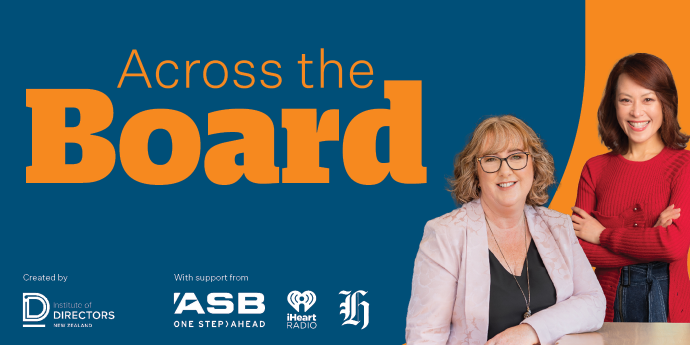OPINION
IMHO: Benefits of board diversity
Increasing diversity in the governance community bodes well for the success of New Zealand boards and their organisations.
Those who sit on boards know that getting that first seat at the table can be challenging. And once you get there it takes “stickability" and determination to stay in a board role, especially when the going gets tough.

This first episode of seven-part podcast series Across the Board, presented by the Institute of Directors (IoD) CEO Kirsten Patterson and former RNZ broadcaster Sonia Yee, explores why good governance matters now more than ever and, most importantly, why we should care.
Download a transcript of this episode.
“Great governance has the power to do great things,” says Dr Michael Fraser, General Manager of learning and branch engagement at The Institute of Directors (IoD).
His eyes light up when speaking about the important role of governance and that includes school boards of trustees. Dr Fraser says those who take on directorship or governance roles love to learn and are willing to invest time to grow their governance skills.
“Governance means many different things to different people. One day you can be talking about identifying modern slavery in the supply chain, another day climate disclosures or workplace culture. There are a range of topics that are identified as opportunities and risks that matter to boards.”
There are increasing challenges in today’s environment and directors need to be across every potential risk, as well as stay abreast of new technology, social issues and new problems such as climate change - an imperative for directors who have to provide transparency across their reporting mechanisms.
All of this has an impact on business, which has subsequent flow-on effects for the community and the health and wellbeing of the people within it.

Photo: Dr Michael Fraser
Fraser highlights the important role of ongoing education and the need for directors to embrace “life-long learning” as a significant part of the contemporary governance landscape. Directors are required to keep up with rapid change in economic circumstances, and community and customer expectations.
“We’re familiar with those stories and the detrimental impact that it can have on people’s lives,” he says of the types of stories that end up hitting the media headlines.
Those negative stories can be anything from a CEO or director speaking out of line to making flippant comments on social media that don’t align with the company’s values. In a very transparent environment directors on boards will ultimately be held to account, not just by the media, but by society at large.
This poses a huge risk for any company or organisation and that includes SME’s, not-for-profits and independent owners of businesses, all of whom need to consider the important role governance plays in the operation of their business.
Brand reputation matters too, whether you’re selling a product or offering a service because customers are prepared to boycott brands if they feel that a company or organisation is behaving unethically.
But if we understand what poor governance looks like, how do we identify good governance in action?
Dr Fraser says positive outcomes from great governance are more likely to remain unseen.
“If you zoom right out from an individual level and think about us as a country and our institutions within it, including how we get our food, our security…our general wellbeing, all of this is underpinned by great governance, it’s just not always that visible,” he says.
“That makes it both a challenging job, but also a fascinating one. A key thread is wanting to make a positive difference,” says Dr Fraser.

Photo: Angela Swann-Cronin (supplied)
“I look at a boardroom like I do the flight crew of an aircraft,” says Angela Swann-Cronin who is now dipping her toes into governance waters.
The Rotorua-based pilot is passionate about education, and having Māori representation on boards.
Swann-Cronin now sits on two boards. One, Search and Rescue Services Ltd, which provides air and medical services south of the Bombays to Wellington. The other is the Board of Trustees for her children’s high school.
Swann-Cronin is been the first and only Māori woman since 1999 to become a pilot in the Royal New Zealand Air Force and says her work and lived experience has equipped her for a new path into governance.
“For me, being a representative of Māori on these boards is to try and elevate Māori into a position where they are achieving at the same rate as their non-Māori peers,” she says.
Swann-Cronin possesses a fearless side that has taken her into spaces that others might find challenging, but this has also equipped her for her new path.
“I’m more of an analyst in looking at risk, but I’m not afraid to take on challenges,” she says. Swann-Cronin is also aware that she is a role model to others. Just before recording her interview for Across the Board, she received a letter from a student at Gisborne Girls High School who wanted to know how to become a pilot for the RNZAF.
It is having that opportunity to make a difference and inspire others that drives Swann-Cronin.
“I might just be a pilot in my full-time job, but I know I’ve got really valuable skills for the boards that I’m on. I encourage more women and more Māori to step into this position, so that we can simply have a voice at the top.”
Listen to the first episode of Across the Board to find out about the history of modern governance in New Zealand, why dressing for success on a board might look different to corporate stereotypes of the past, and you’ll hear from a director who sat on the board of the car manufacturing company, Toyota New Zealand Limited.
iHeart Radio | Apple Podcast Player | Spotify
The podcast is sponsored by ASB bank and in partnership with the NZ Herald, launched December, 2022.
